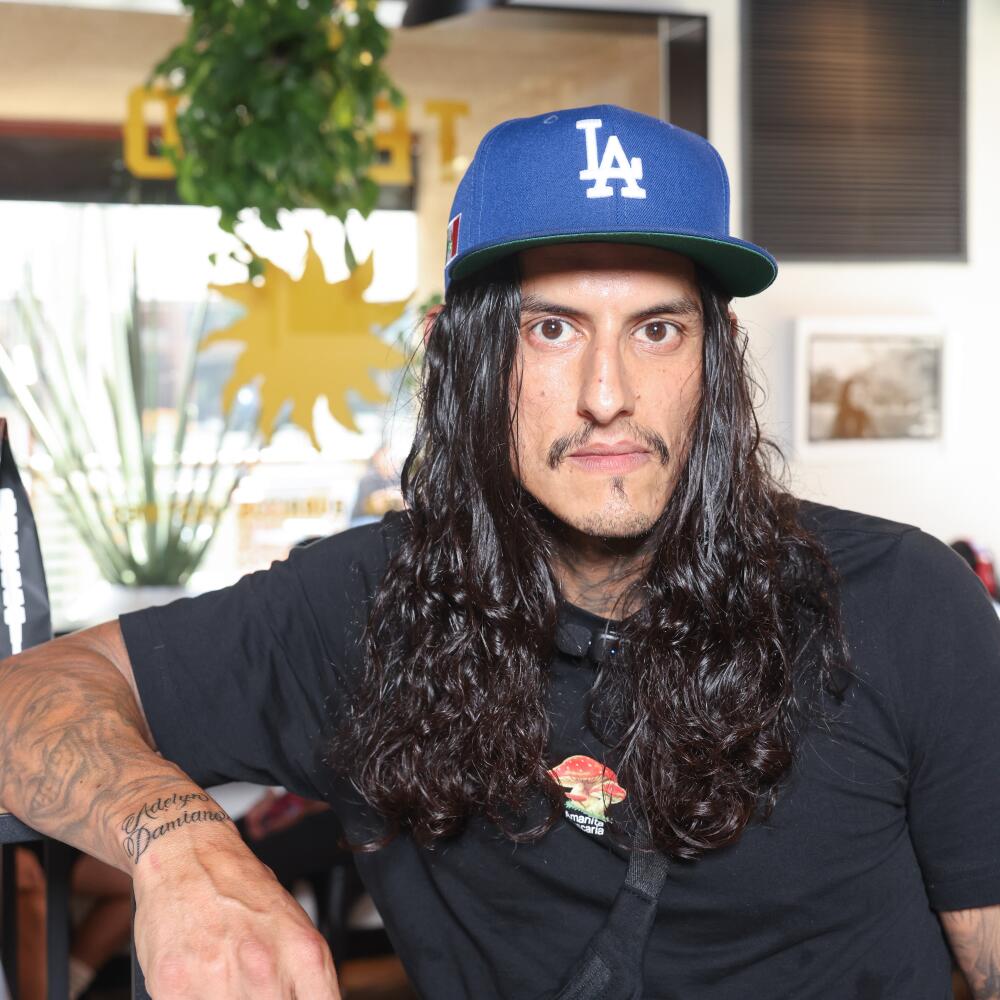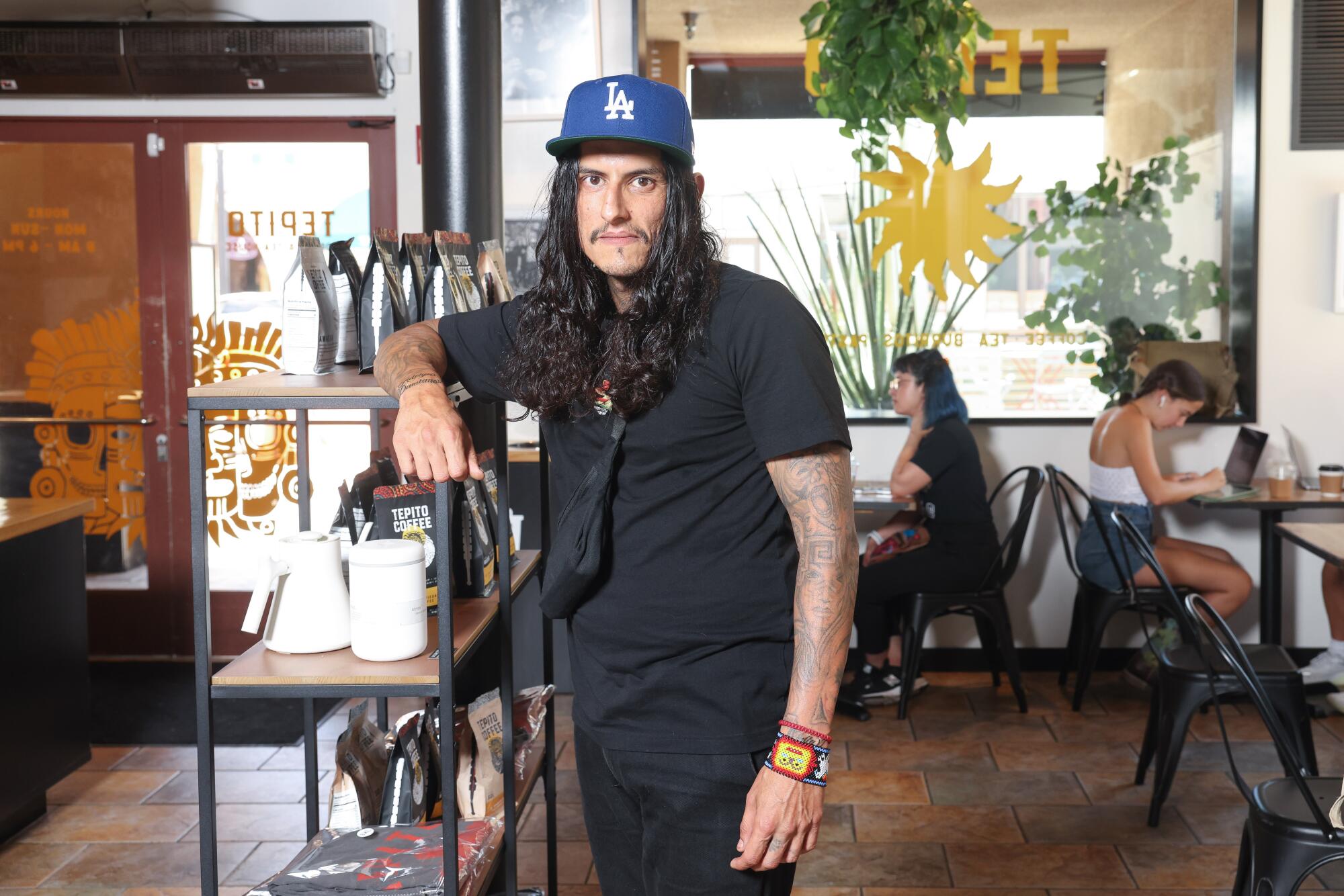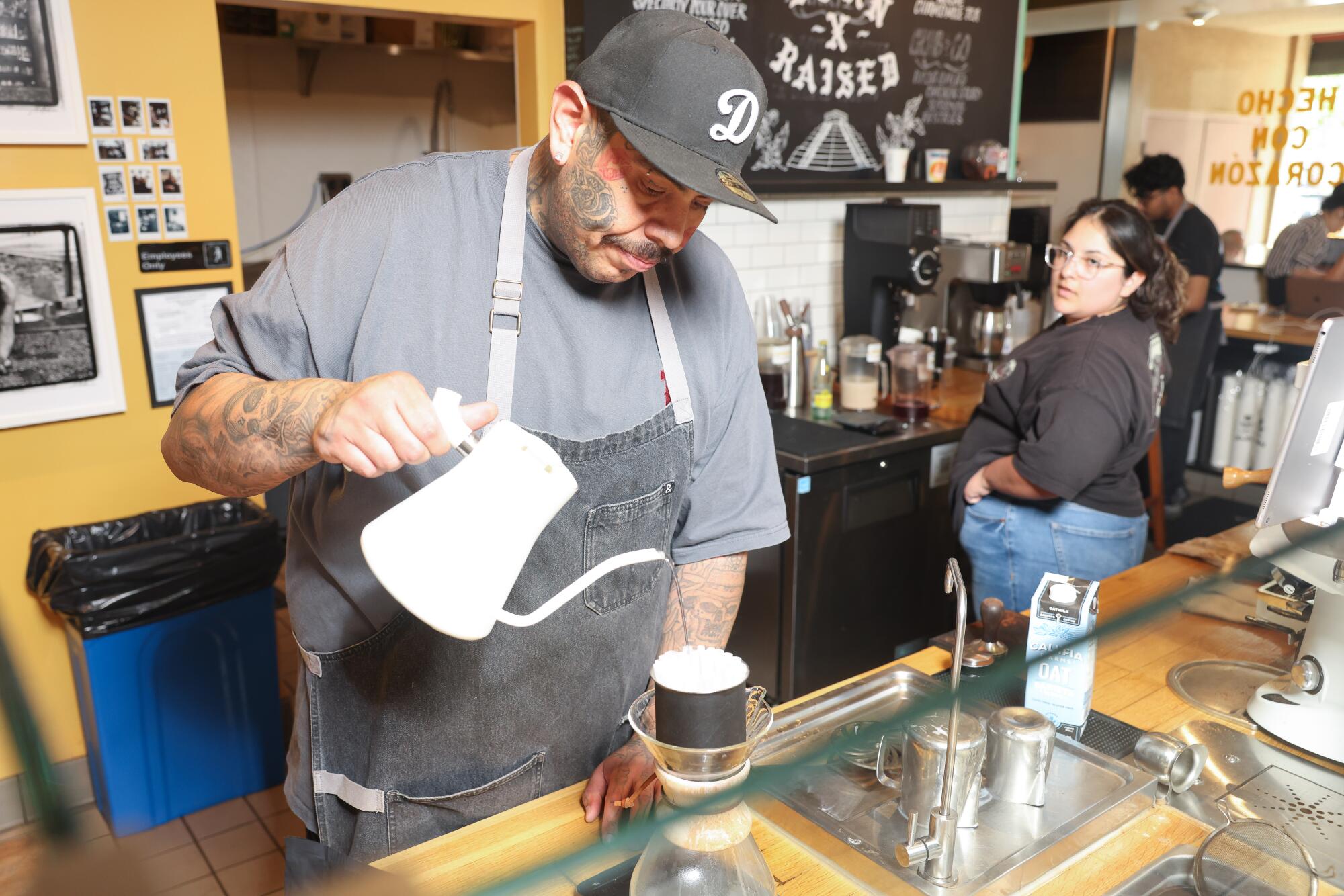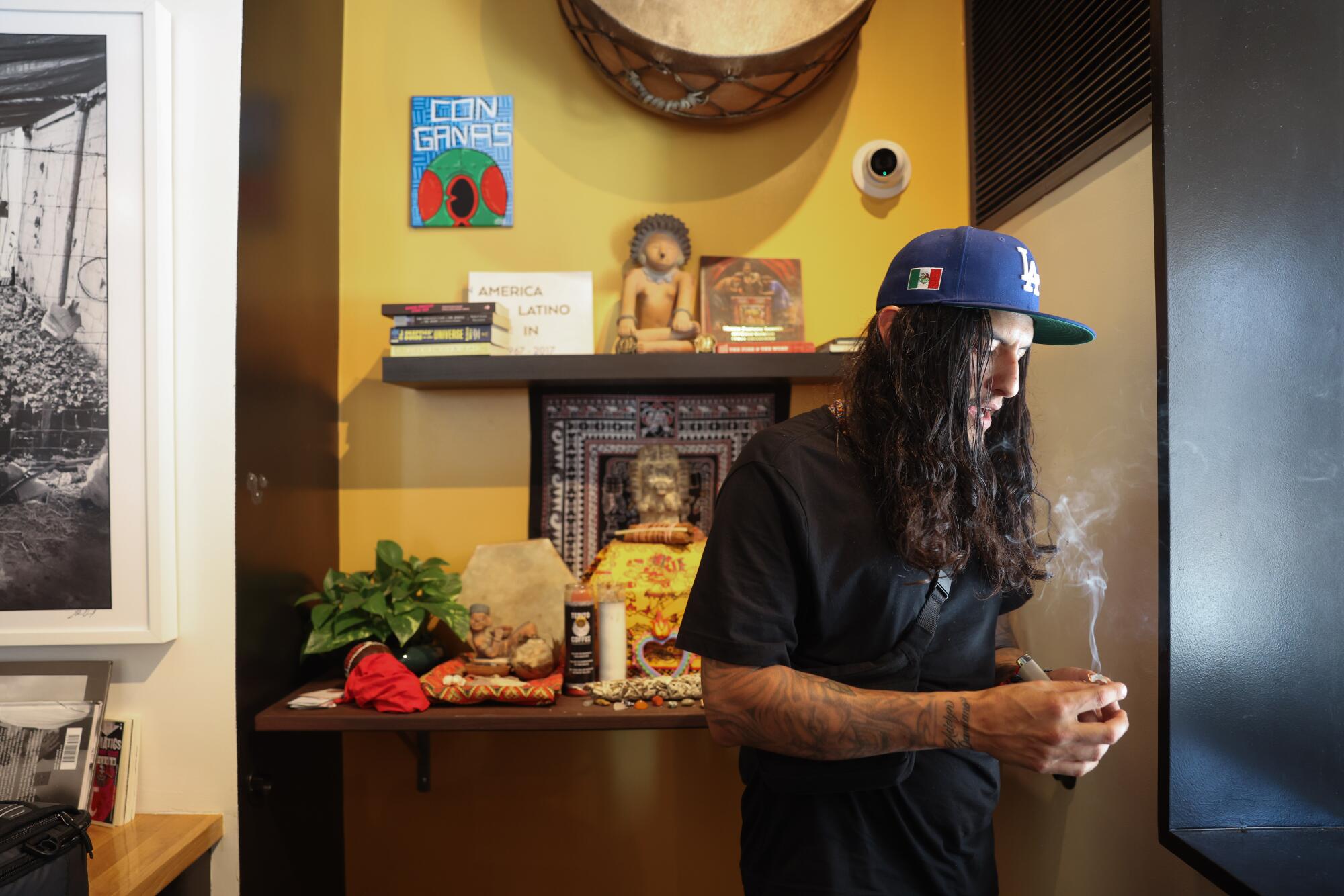
- Share via
Actor Richard Cabral and Jose Arellano of Homeboy Industries had a moment of reflection one recent Friday as they drove to Montebello from their coffee shop, Tepito, in the heart of Pasadena.
They cruised through South Pasadena, known for its Craftsman houses and tree-lined neighborhoods often used for filming locations.
“Public narratives about Latinos’ economic condition place far too much emphasis on individual behaviors of the group, rather than structural factors such as discrimination.”
“Never in a million years would we have driven down a street like this, [seeing] such beauty and architecture and the peace that those communities have,” said Arellano, who grew up in a family involved with gangs.
This is precisely why, they say, Tepito Coffee & Tea House — which opened in December inside Vroman’s Bookstore — makes sense in a wealthy city like Pasadena.
A former gang member who left his criminal past behind, Cabral has found success in Hollywood, earning an Emmy nomination in 2015 for his portrayal of Henry Tontz in ABC’s anthology series “American Crime.” His career — which includes the beloved role of Johnny “Coco” Cruz in “Mayans M.C.” — has led him to places outside of his Boyle Heights and East L.A. upbringing.
“I’ve experienced things. I’ve traveled the world now,” Cabral said.
He wants the same for others like him.
This comic celebrates the importance of cultural comfort and the role that local grocery stores can play in creating a sense of home away from home.
Tepito — Cabral and Arellano co-own it alongside musician and entrepreneur Mike de la Rocha — got started by selling coffee beans, T-shirts, coffee cups, and aprons online. Their beans are produced by a farm in Veracruz, Mexico.
Their first pop-up was held in July 2021 in downtown L.A. on the border of Boyle Heights, and soon after they began selling their coffee beans at 3rd Street market in East L.A. and elsewhere. They filled a vacant space inside Vroman’s after Jones Coffee Roasters closed that location. It’s Tepito’s first brick-and-mortar.
Cabral began drinking coffee at a young age. Nescafé is “something that’s in our culture,” he said. Once in prison, Cabral learned that coffee “is everything.” Used for bartering, it’s one of the highest traded products, he said, adding: “It’s the fuel of inmates.”
But it would be years until Cabral’s interest in coffee materialized into a business.
After his Emmy nomination, Cabral recalls ABC sending him a gift box that included a bag of coffee beans. Cabral didn’t know what to do with it, so he called a friend, who told him he needed to grind the beans. He didn’t have a grinder, but he got the next best thing, a molcajete.
Cabral crushed the beans as if he were grinding chiles to make salsa. He doesn’t remember how he filtered it, but he said, “That was the most delicious coffee I’ve ever tasted because it was fresh.”
Just like that, he realized, “I’ve been drinking coffee the wrong way my whole life.”
“Now, it’s teaching our people [that], ‘Hey, you could have good coffee. You don’t need azucar. You don’t need the creamer,” Cabral said.

In 2019, Cabral attended a coffee festival in L.A. in search of producers and farmers from Mexico. He noticed a lack of Latino owners and representatives, but toward the end of the event, he spotted coffee farmer Carlos Avendaño of Pecora 19º09´, a coffee company in Boca del Monte, a small farming town in Veracruz, Mexico.
Cabral and Avendano hit it off, and now Pecora 19º09´ produces whole bean coffee bags for Tepito. Tasting notes include blackberry, vanilla and clover in the Sol blend or strawberry, hazelnut, honey and chocolate in the Warrior flavor.
Tepito employs about nine people and includes an internship program with Homeboy Industries, Father Gregory Boyle’s rehabilitation program that provides formerly incarcerated and gang-involved men and women with jobs as an alternative to gang life.
Cabral himself found guidance through Homeboy Industries, where he answered phones at the front desk, attended Narcotics Anonymous meetings and worked in the bakery for about two years. When Central Casting came to Homeboy looking for extras for a “CSI: Miami” episode, Cabral went for it. He landed his first speaking role in TNT’s “Southland.”
“The story of Tepito cannot be told without Homeboy,” he said.
Through the Homeboy partnership, Cabral’s cousin Paul Navarro, now known as Paulie the Barista, learned to operate an espresso machine, and was soon making mochas and lattes at a pop-up in downtown L.A. He was hooked. Homeboy supplemented his income while he learned the ropes at Tepito. Now, he’s a full-time barista paid by Tepito.

For Navarro, 37, making coffee, “it’s like a science.”
He worked at several of Homeboy’s social enterprises, including the bakery and the recycling and electronics company. But the barista training is what stuck.
Navarro — who has tattoos running up and down his face, neck and arms — said it’s gratifying providing refreshing and hot drinks to customers, as well “being acknowledged by people in a good way.”
Sometimes he gets stares, but interacting with customers helps with his social anxiety. Plus, he said, perceptions change “as soon as they start talking to me.”
Arellano, who serves as vice president at Homeboy, sees their presence in Pasadena as a form of “reverse gentrification.”
He’s reminded of the outlawed practice of redlining, which denied home ownership and financial services to residents based on race. Restrictive land covenants made it impossible for people of color to live in certain areas. The L.A. metro area continues to be among the most segregated regions, recent research shows.
“There’s always been these invisible imaginary lines that separate our communities from one another,” Arellano said.
To Arellano, it’s about being in proximity to areas with resources, where the schools are better, and where accessing healthy foods is easier.
He expressed this at a gathering of “Homie 2 Homie” — an initiative aiming to connect marginalized people, including those who may have been incarcerated or in gangs, with professionals working in different trades — on Sunday at Tepito’s outside patio.
“This is L.A. This is part of your community, too,” he told those in attendance.
These gatherings happen every other Sunday at Tepito. Dog groomers and trainers, artists, barbers, chefs, those going through the program at Homeboy Industries, and people working in the nonprofit sector are among those who attend.
They begin with healing circles grounded in Indigenous spiritual practices, to talk about issues like trauma. They burn sage, and in one recent gathering, tattoo artist Ernesto Burbank offered prayers for Chris “Spanto” Printup, founder of streetwear brand Born X Raised, who died this summer.
Spirituality is front and center at Tepito, which in Nahuatl translates to “little temple.”

An altar is placed near the coffee shop’s entrance. Altar offerings have included cacao, sweet grass, sage, candles, an image of the Virgen de Guadalupe and other items gifted by customers.
“If you ask me about spirituality, I am connected to our ancestors. Where we’re from, Mexico, our ancestors are alive and breathing — those ruins, those pyramids, those ceremonies,” said Cabral.
Black-and-white photos of his father’s hometown of Jerez in Zacatecas, Mexico, hang on Tepito’s walls. They’re from a recent trip Cabral took with his father and son. They visited the archaeological site La Quemada — known as the largest pre-Hispanic urban settlement in north central Mexico — and spent time in his grandmother’s house in Jerez.
Cabral wanted his son to “understand the simplicity of life” that his grandmother returned to once she retired from working at a sweatshop in downtown L.A.
“I wanted to find out, what is the reason that my grandmother, she could have lived in the United States, but she went back to her rancho. There must be something good in that,” Cabral said.
“The world is much greater than what they have told us … Living in a simple way, there’s blessings that come [with] that,” he said.
More to Read
The Latinx experience chronicled
Get the Latinx Files newsletter for stories that capture the multitudes within our communities.
You may occasionally receive promotional content from the Los Angeles Times.










